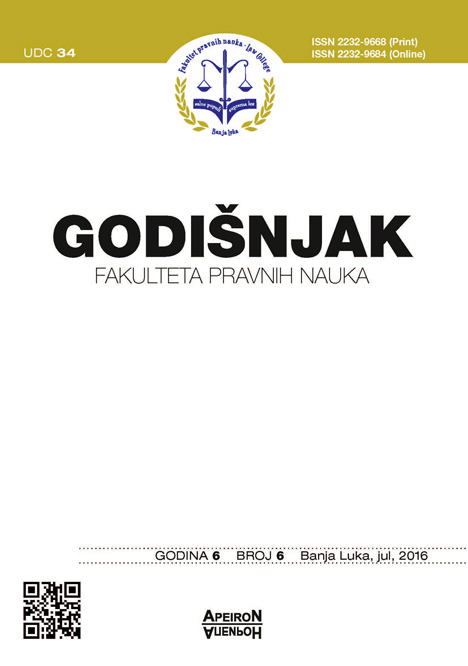Mirno rješavanje međudržavnih sporova – određeni aspekti upotrebe diplomatskih i pravnih sredstava / Peacefull Settlement of Interstate Disputes – Certain Aspects of the Use of Diplomatic and Judicial Means
DOI:
https://doi.org/10.7251/GFP1606151GAbstract
Development of inter-state relationships may lead to the point where diverging attitudes of States appear regarding a concrete issue. In certain situations, this divergence can be treated as a dispute, either of diplomatic or legal nature. All States are due to settle their disputes by peaceful means, which further implies their duty to undertake measures to overcome the dispute. The use of force is, in principle forbidden in the dispute settlement. The International Law and diplomacy have developed a number of means for dispute settlement. Those means are grouped in two sets: diplomatic and judicial means. The practice shows the use of different means, but it is not unusual that several means may be used to settle the same dispute, either consecutively or simultaneously. This paper attempts to assess whether it is possible to identify a set of rules in the International Law that are encouraging use of particular dispute settlement means. The paper concludes that concensualism is the governing principle of dispute settlement under the International law, which connotes that the parties to a dispute, either ex ante or ex post have to agree, explicitly or implicitly, what dispute settlement means to apply in the concrete case. Given the prevailing significance of concensualism, as the governing principle in the area of dispute settlement, it is difficult to identify some general rules which would define what means to use at what stage. It is quite impossible to pre-determine what dispute settlement means would be used by the parties in a concrete settlement process. Never the less, certain level of predictability exists if the parties agreed in advance on the manner in which disputes are to be settled. The findings and conclusions in this paper are based on the exploration of available cases from the international practice and writings by scholars.Downloads
Published
2016-07-11
Issue
Section
Чланци
